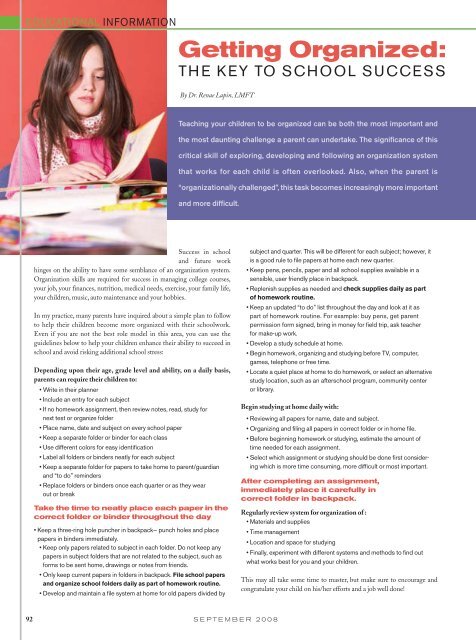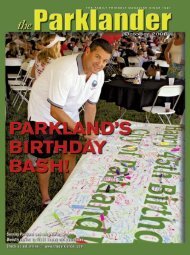September 2008 - The Parklander Magazine
September 2008 - The Parklander Magazine
September 2008 - The Parklander Magazine
Create successful ePaper yourself
Turn your PDF publications into a flip-book with our unique Google optimized e-Paper software.
EDUCATIONAL INFORMATION<br />
Getting Organized:<br />
THE KEY TO SCHOOL SUCCESS<br />
By Dr. Renae Lapin, LMFT<br />
Teaching your children to be organized can be both the most important and<br />
the most daunting challenge a parent can undertake. <strong>The</strong> significance of this<br />
critical skill of exploring, developing and following an organization system<br />
that works for each child is often overlooked. Also, when the parent is<br />
“organizationally challenged”, this task becomes increasingly more important<br />
and more difficult.<br />
Success in school<br />
and future work<br />
hinges on the ability to have some semblance of an organization system.<br />
Organization skills are required for success in managing college courses,<br />
your job, your finances, nutrition, medical needs, exercise, your family life,<br />
your children, music, auto maintenance and your hobbies.<br />
In my practice, many parents have inquired about a simple plan to follow<br />
to help their children become more organized with their schoolwork.<br />
Even if you are not the best role model in this area, you can use the<br />
guidelines below to help your children enhance their ability to succeed in<br />
school and avoid risking additional school stress:<br />
Depending upon their age, grade level and ability, on a daily basis,<br />
parents can require their children to:<br />
• Write in their planner<br />
• Include an entry for each subject<br />
• If no homework assignment, then review notes, read, study for<br />
next test or organize folder<br />
• Place name, date and subject on every school paper<br />
• Keep a separate folder or binder for each class<br />
• Use different colors for easy identification<br />
• Label all folders or binders neatly for each subject<br />
• Keep a separate folder for papers to take home to parent/guardian<br />
and “to do” reminders<br />
• Replace folders or binders once each quarter or as they wear<br />
out or break<br />
Take the time to neatly place each paper in the<br />
correct folder or binder throughout the day<br />
• Keep a three-ring hole puncher in backpack— punch holes and place<br />
papers in binders immediately.<br />
• Keep only papers related to subject in each folder. Do not keep any<br />
papers in subject folders that are not related to the subject, such as<br />
forms to be sent home, drawings or notes from friends.<br />
• Only keep current papers in folders in backpack. File school papers<br />
and organize school folders daily as part of homework routine.<br />
• Develop and maintain a file system at home for old papers divided by<br />
subject and quarter. This will be different for each subject; however, it<br />
is a good rule to file papers at home each new quarter.<br />
• Keep pens, pencils, paper and all school supplies available in a<br />
sensible, user friendly place in backpack.<br />
• Replenish supplies as needed and check supplies daily as part<br />
of homework routine.<br />
• Keep an updated “to do” list throughout the day and look at it as<br />
part of homework routine. For example: buy pens, get parent<br />
permission form signed, bring in money for field trip, ask teacher<br />
for make-up work.<br />
• Develop a study schedule at home.<br />
• Begin homework, organizing and studying before TV, computer,<br />
games, telephone or free time.<br />
• Locate a quiet place at home to do homework, or select an alternative<br />
study location, such as an afterschool program, community center<br />
or library.<br />
Begin studying at home daily with:<br />
• Reviewing all papers for name, date and subject.<br />
• Organizing and filing all papers in correct folder or in home file.<br />
• Before beginning homework or studying, estimate the amount of<br />
time needed for each assignment.<br />
• Select which assignment or studying should be done first considering<br />
which is more time consuming, more difficult or most important.<br />
After completing an assignment,<br />
immediately place it carefully in<br />
correct folder in backpack.<br />
Regularly review system for organization of :<br />
• Materials and supplies<br />
• Time management<br />
• Location and space for studying<br />
• Finally, experiment with different systems and methods to find out<br />
what works best for you and your children.<br />
This may all take some time to master, but make sure to encourage and<br />
congratulate your child on his/her efforts and a job well done!<br />
92 SEPTEMBER <strong>2008</strong>
















